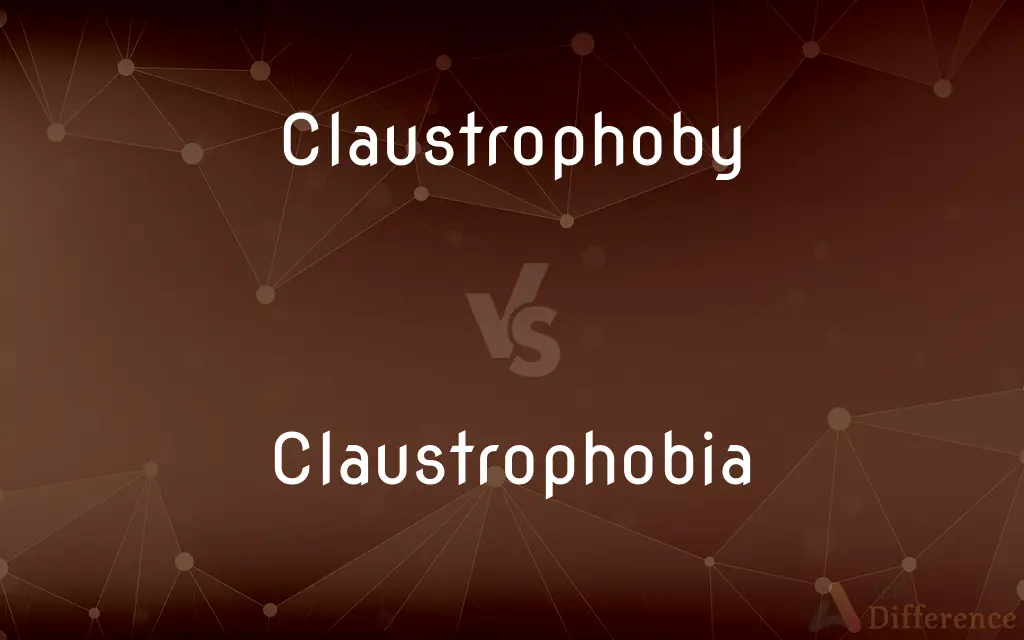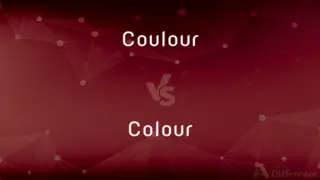Claustrophoby vs. Claustrophobia — Which is Correct Spelling?
Edited by Tayyaba Rehman — By Fiza Rafique — Updated on April 4, 2024
"Claustrophoby" is incorrect, while "Claustrophobia" is the accurate spelling, describing an irrational fear of confined spaces.

Table of Contents
Which is correct: Claustrophoby or Claustrophobia
How to spell Claustrophobia?

Claustrophoby
Incorrect Spelling

Claustrophobia
Correct Spelling
ADVERTISEMENT
Key Differences
Relate "phobia" with other fear terms like "arachnophobia" for consistency in spelling.
Envision being in a “claustro” (cloister) that causes “phobia” (fear).
Remember the correct spelling has “-phobia,” which is common in naming fears.
Mentally divide the word: Claustro-phobia.
Picture the word having two ‘a’s to avoid misspelling as “claustrophoby.”
ADVERTISEMENT
How Do You Spell Claustrophobia Correctly?
Incorrect: Is claustrophoby treatable with therapy?
Correct: Is claustrophobia treatable with therapy?
Incorrect: Many people confuse claustrophoby with a simple dislike of confined spaces.
Correct: Many people confuse claustrophobia with a simple dislike of confined spaces.
Incorrect: He experiences severe claustrophoby when in elevators.
Correct: He experiences severe claustrophobia when in elevators.
Incorrect: Her claustrophoby prevents her from taking the subway.
Correct: Her claustrophobia prevents her from taking the subway.
Incorrect: I never knew I had claustrophoby until I got stuck in that tiny room.
Correct: I never knew I had claustrophobia until I got stuck in that tiny room.
Claustrophobia Definitions
Claustrophobia involves panic in response to being enclosed.
Claustrophobia is classified as a specific phobia in psychiatric diagnoses.
Claustrophobia is an intense fear of small or enclosed spaces.
She avoids elevators due to her claustrophobia.
Claustrophobia is a psychological condition causing avoidance of confined areas.
Claustrophobia pertains to anxiety experienced in restricted environments.
Fear of being in narrow or enclosed spaces.
The fear of closed, tight places.
A morbid fear of being closed in a confined space
Claustrophobia Meaning in a Sentence
His claustrophobia made it difficult for him to fly in airplanes.
Claustrophobia can make MRI scans a challenging experience.
The idea of being in a cave filled him with claustrophobia.
She avoided crowded places because her claustrophobia would kick in.
Elevators are a nightmare for people with claustrophobia.
He didn't realize he had claustrophobia until he was in a crowded elevator.
Claustrophobia isn't just a fear of small spaces; it's the panic that comes with it.
Claustrophobia can stem from a traumatic experience in a confined space.
Some people develop claustrophobia suddenly, without any obvious reason.
She practices visualization exercises to overcome her claustrophobia.
Claustrophobia is more common than many people think.
When her claustrophobia got worse, she sought therapy.
Claustrophobia made him choose stairs over elevators every time.
Theme park rides can be a big challenge for someone with claustrophobia.
Movies that feature characters trapped in small spaces can trigger claustrophobia.
She avoids taking the subway because of her claustrophobia.
Understanding the root of his claustrophobia was a breakthrough in his therapy.
Claustrophobia can limit one's travel options significantly.
Learning breathing techniques helped her manage her claustrophobia.
She uses meditation to calm her claustrophobia before flights.
Parents sometimes don't understand their child's claustrophobia.
His claustrophobia is why he prefers open spaces.
Claustrophobia often requires professional treatment to manage effectively.
Claustrophobia can make a person feel like the walls are closing in on them.
Common Curiosities
Why is it called Claustrophobia?
From Latin “claustrum” (closed space) and Greek “phobos” (fear).
What is the pronunciation of Claustrophobia?
/ˌklɔːstrəˈfoʊbiə/
What is the plural form of Claustrophobia?
Claustrophobias (rarely used).
What is the verb form of Claustrophobia?
No direct verb form, but can be expressed as "to experience claustrophobia."
Which vowel is used before Claustrophobia?
A; as in “a claustrophobia case.”
Which preposition is used with Claustrophobia?
"Of," as in “fear of claustrophobia.”
Which conjunction is used with Claustrophobia?
No specific conjunction is inherently associated.
Is Claustrophobia a noun or adjective?
Noun.
What is the root word of Claustrophobia?
"Claustrum" (Latin) and "Phobos" (Greek).
Which article is used with Claustrophobia?
“The” or “a.”
Is Claustrophobia an abstract noun?
Yes.
Is Claustrophobia a countable noun?
No.
Is the word Claustrophobia a Gerund?
No.
Is the word “Claustrophobia” a Direct object or an Indirect object?
Can be either, depending on sentence construction.
What part of speech is Claustrophobia?
Noun.
What is the opposite of Claustrophobia?
Agoraphobia (fear of open spaces) might be considered contextually opposite.
What is the singular form of Claustrophobia?
Claustrophobia.
Which determiner is used with Claustrophobia?
“This,” "my," or “her” depending on context.
Is Claustrophobia a negative or positive word?
Negative.
Is the word Claustrophobia imperative?
No.
What is a stressed syllable in Claustrophobia?
"Pho" is stressed.
What is another term for Claustrophobia?
Fear of confined spaces.
How is Claustrophobia used in a sentence?
"Her claustrophobia prevents her from using elevators, opting for stairs instead."
Is Claustrophobia a collective noun?
No.
How many syllables are in Claustrophobia?
5 syllables.
Is Claustrophobia an adverb?
No.
Is Claustrophobia a vowel or consonant?
It is a word, not a letter.
Is the Claustrophobia term a metaphor?
No.
How do we divide Claustrophobia into syllables?
claus-tro-pho-bi-a.
Share Your Discovery

Previous Comparison
Coulour vs. Colour
Next Comparison
Merchandizing vs. MerchandisingAuthor Spotlight
Written by
Fiza RafiqueFiza Rafique is a skilled content writer at AskDifference.com, where she meticulously refines and enhances written pieces. Drawing from her vast editorial expertise, Fiza ensures clarity, accuracy, and precision in every article. Passionate about language, she continually seeks to elevate the quality of content for readers worldwide.
Edited by
Tayyaba RehmanTayyaba Rehman is a distinguished writer, currently serving as a primary contributor to askdifference.com. As a researcher in semantics and etymology, Tayyaba's passion for the complexity of languages and their distinctions has found a perfect home on the platform. Tayyaba delves into the intricacies of language, distinguishing between commonly confused words and phrases, thereby providing clarity for readers worldwide.


































